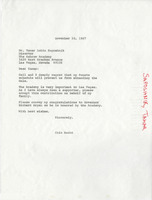Search the Special Collections and Archives Portal
Search Results

Temple Beth Sholom Sisterhood scrapbook, image 93
Description
An invitation from Committee for Jewish Education Principal Harvey Hirsh for the Chanukah Celebration, November 25, 1956

Isaac Barrón oral history interview: transcript
Date
Archival Collection
Description
Oral history interview with Isaac Barrón conducted by Maribel Estrada Calderón and Claytee D. White on March 27, 2019 for the Latinx Voices of Southern Nevada Oral History Project. Isaac Barrón was born and raised in Las Vegas, Nevada. His father entered the United States as a Bracero. Barrón attended Rancho High School and earned his bachelor's degree in secondary education from UNLV. He currently teaches history at Rancho High School and serves as North Las Vegas' Councilman. In this oral history, Barrón recalls his youth in North Las Vegas, navigating the presence of gangs, and his path to being a community activist and advocate for North Las Vegas youth. He has led volunteer efforts for community improvement projects, including the plans for a new public library. He holds the distinction of being the first Latinx member of the North Las Vegas City Council and Southern Nevada's first Hispanic Mayor Pro Tempore. In 2013, he was elected to represent Ward 1 and was reelected for a second term in April 2017. He discusses being Mexican American, the Coalition of Pan American Organizations, the Hispanic Student Union, the Bracero Program, and Rancho High School.
Text
Lucile Nyberg oral history interview
Identifier
Abstract
Oral history interview with Lucile Nyberg conducted by Alison Hartough on February 22, 1978 for the Ralph Roske Oral History Project on Early Las Vegas. In this interview, Nyberg discusses the history of Overton, Nevada and life in the town. Nyberg describes early Las Vegas, Nevada and life in Boulder City, Nevada. Nyberg goes on to discuss her career as a teacher and the changes made to education in Las Vegas. Nyberg also discusses the development and the economy of Las Vegas, and briefly discusses prostitution in the city. Nyberg's husband, Richard Nyberg, is present during the interview, but does not speak.
Archival Collection
Alma Vining oral history interview
Identifier
Abstract
Oral history interview with Alma Vining conducted by Christine Carrera on April 10, 2006 for the Public School Principalship Oral History Project. In this interview, Vining reflects upon her 30-year career as an elementary school teacher and administrator with Nevada’s Clark County School District (CCSD) from the 1970s to the 2000s. She describes the process by which she became an administrator, her regular responsibilities, and challenges that she faced. She also discusses school district programs such as No Child Left Behind, bilingual education, and school integration.
Archival Collection
Nevada Wildlife Federation Records
Identifier
Abstract
The Nevada Wildlife Federation Records (1989-1997) consist of pamphlets, newsletters, periodic meeting minutes, and a copy of the bylaws of the Nevada Wildlife Federation.
Archival Collection

Transcript of interview with Rabbi Bradley Tecktiel by Barbara Tabach, April 19, 2016
Date
Archival Collection
Description
Rabbi Bradley Tecktiel was born June 28, 1968 in Chicago, Illinois. He moved to New York City to attend university, where he received two Bachelor of Arts degrees: one from List College and one from Columbia University. He went on to achieve a Master?s degree from the Jewish Theological Seminary. Soon after graduating in 1996, Rabbi Tecktiel accepted his first clergy position in New Rochelle, New York. From there he went on to lead a congregation in Louisville, Kentucky, before eventually moving to Las Vegas to become the spiritual leader of Midbar Kodesh Temple in 2008. In this interview, Rabbi Tecktiel discusses the path that eventually brought him, his wife, Susan, and their three children to Las Vegas. He talks about his passion for developing Jewish community engagement and programming, and specifically about Midbar Kodesh Temple initiatives, including Yom HaShoah and educational programming. In addition, Rabbi Tecktiel reflects upon the growth of the Jewish community, both those affiliated and unaffiliated, and the impact of Jews on Las Vegas?, as well as Nevada?s, development.
Text

Meeting minutes for Consolidated Student Senate, University of Nevada, Las Vegas, January 10, 1984
Date
Archival Collection
Description
Text

Edith Fernandez oral history interview: transcript
Date
Archival Collection
Description
Oral history interview with Edith Fernandez conducted by Marcela Rodriguez-Campo and Claytee D. White on September 27, 2018 for the Latinx Voices of Southern Nevada Oral History Project. In this interview, Fernandez discusses her upbringing in Las Vegas, Nevada and growing up in the Charleston Heights neighborhood. She recalls living in a predominantly white community, and the growth of Latinx families in that area. Fernandez talks about her educational experience in the city, her father's involvement with Culinary Worker Union Local 226, and identifying as a Chicana American. Later, Fernandez remembers her involvement with opening the Cambridge Center, working with the Latino Youth Leadership Conference (LVLC), and becoming the District Director for Representative Steven Horsford. Lastly, Fernandez discusses her role as the Associate Vice President at Nevada State College (NSC).
Text
Community2Campus Re-Entry Scholarship Reception held in the Student Union on September 5, 2013: digital photographs
Date
Archival Collection
Description
Image

